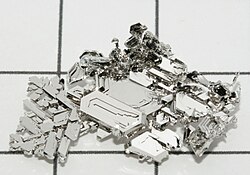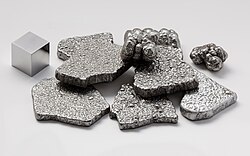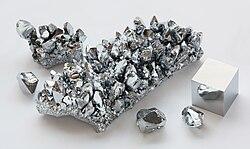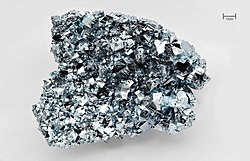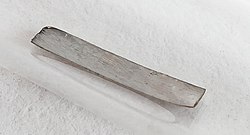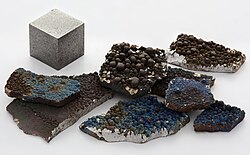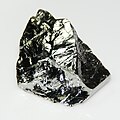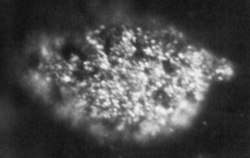Ruthenium(IV) oxide is the inorganic compound with the formula RuO2. This black solid is the most common oxide of ruthenium. It is widely used as an electrocatalyst...
8 KB (729 words) - 02:52, 6 May 2025
This page provides supplementary chemical data on ruthenium(IV) oxide. The handling of this chemical may require notable safety precautions. Safety information...
4 KB (62 words) - 14:58, 11 April 2023
defined chemically but versatile synthetically. Ruthenium can be oxidized to ruthenium(IV) oxide (RuO2, oxidation state +4), which can, in turn, be oxidized...
50 KB (5,600 words) - 10:16, 9 June 2025
Tris(bipyridine)ruthenium(II) chloride is the chloride salt coordination complex with the formula [Ru(bpy)3]Cl2. This polypyridine complex is a red crystalline...
14 KB (1,301 words) - 21:11, 24 May 2025
Iridium (category Pages using the Phonos extension)
Levason, W. (1982). "The chemistry of ruthenium, osmium, rhodium, iridium, palladium and platinum in the higher oxidation states". Coordination Chemistry Reviews...
81 KB (7,830 words) - 09:18, 25 May 2025
Valence (chemistry) (category Wikipedia indefinitely semi-protected pages)
in other words, it has valence 7), and it has oxidation state +7; in ruthenium tetroxide RuO4, ruthenium has 8 valence bonds (thus, it is octavalent, in...
40 KB (2,914 words) - 12:59, 11 January 2025
Barium ruthenate (category Transition metal oxides)
oxide and ruthenium(IV) oxide at temperatures below 1200 °C, or from the thermal decomposition of Ba[Ru(NO)(NO2)4(OH)]·xH2O. It reacts with ruthenium...
4 KB (267 words) - 04:17, 29 May 2025
In chemistry, the oxidation state, or oxidation number, is the hypothetical charge of an atom if all of its bonds to other atoms are fully ionic. It describes...
47 KB (12,011 words) - 15:23, 12 May 2025
Platinum (redirect from Platinum(IV))
and platinum(IV) bromides are known as well. Platinum hexafluoride is a strong oxidizer capable of oxidizing oxygen. Platinum(IV) oxide, PtO2, also known...
67 KB (7,087 words) - 07:43, 9 June 2025
Iron (category Pages using the Phonos extension)
including the other group 8 elements, ruthenium and osmium. Iron forms compounds in a wide range of oxidation states, −4 to +7. Iron also forms many...
149 KB (16,921 words) - 09:25, 25 May 2025
Chromium (redirect from Chromium(IV))
Chromium(IV) oxide is used to manufacture magnetic tape used in high-performance audio tape and standard audio cassettes. Chromium(III) oxide (Cr2O3) is...
112 KB (12,288 words) - 20:21, 29 May 2025
Osmium (category Pages using the Phonos extension)
iridium's +9 and is encountered only in xenon, ruthenium, hassium, iridium, and plutonium. The oxidation states −1 and −2 represented by the two reactive...
52 KB (5,885 words) - 16:49, 23 May 2025
KP1019 (category Ruthenium(IV) compounds)
four ruthenium anti-cancer drugs to enter into phase I clinical trials, the others being BOLD-100, NAMI-A and TLD-1433. Research into ruthenium-based...
11 KB (1,278 words) - 03:57, 5 June 2025
Technetium (category Wikipedia articles needing page number citations from June 2021)
Dmitri Mendeleev contained a gap between molybdenum (element 42) and ruthenium (element 44). In 1871, Mendeleev predicted this missing element would...
68 KB (7,677 words) - 22:55, 6 June 2025
Titanium (redirect from Titanium(IV))
element; it has symbol Ti and atomic number 22. Found in nature only as an oxide, it can be reduced to produce a lustrous transition metal with a silver...
81 KB (8,956 words) - 16:47, 9 June 2025
Iridium(III) chloride (category Chembox having GHS data)
anhydrous form at 200 °C, which then oxidizes in air at 763 °C to iridium(IV) oxide, which then decomposes to iridium metal at 1070 °C. However, under hydrogen...
10 KB (784 words) - 23:40, 10 March 2025
Manganese (redirect from Manganese(IV))
cause both the oxidation of Mn2+ to the oxides, and it can cause reduction of the oxides to the divalent cation. The Mn(III,IV) oxides exist as brownish-black...
91 KB (10,176 words) - 05:58, 2 June 2025
Oxidizing agent (redirect from Oxidation half reaction)
2O 4(OH) 4]2− ) Nitrous oxide (N2O), Nitrogen dioxide/Dinitrogen tetroxide (NO2 / N2O4) Sodium bismuthate (NaBiO3) Cerium (IV) compounds such as ceric...
9 KB (889 words) - 10:32, 20 April 2025
Neptunium (category Pages using the Phonos extension)
Np4+ tends to hydrolyze to form the neutral neptunium(IV) hydroxide (Np(OH)4) and neptunium(IV) oxide (NpO2). Neptunium(V) Np(V) or NpO+ 2 is green-blue...
114 KB (13,784 words) - 08:49, 31 May 2025
Retrieved 30 December 2022. "Germanium (Ge) bulk modulus". Group IV Elements, IV-IV and III-V Compounds. Part a - Lattice Properties. Landolt-Börnstein...
17 KB (418 words) - 02:46, 26 May 2025
Lanthanide (redirect from Lanthanide oxide)
CeO2 is used as an oxidation catalyst in catalytic converters. Praseodymium and terbium form non-stoichiometric oxides containing LnIV, although more extreme...
109 KB (10,480 words) - 05:57, 26 May 2025
Germanium (category Group IV semiconductors)
without generating harmful hydrogen gas, replacing zinc oxide- and indium gallium zinc oxide-based implementations. Germanium was also used to create...
68 KB (7,216 words) - 23:30, 6 June 2025
Transition metal (redirect from Metal Oxidation States)
decreases in the later elements. In the second row, the maximum occurs with ruthenium (+8), and in the third row, the maximum occurs with iridium (+9). In compounds...
40 KB (4,500 words) - 18:28, 24 May 2025
Cerium (category Chembox having GHS data)
ISBN 978-1-000-82129-1. "Cerium(IV) oxide, REacton Safety Data Sheet". Fisher Scientific. March 27, 2024. Retrieved August 27, 2024. "Cerium Safety Data Sheet" (PDF). Ames...
51 KB (6,075 words) - 14:45, 1 June 2025
Berkelium (category Pages using the Phonos extension)
with the berkelium oxidation state of +3 (Bk2O3) and +4 (BkO2). Berkelium(IV) oxide is a brown solid, while berkelium(III) oxide is a yellow-green solid...
62 KB (7,587 words) - 23:21, 7 June 2025
Vanadium (redirect from Vanadium(IV))
artificially, the formation of an oxide layer (passivation) somewhat stabilizes the free metal against further oxidation. Spanish-Mexican scientist Andrés...
75 KB (8,589 words) - 16:07, 28 May 2025
Group 5 element (section Oxides)
vanadium(II) oxide, vanadium(III) oxide, vanadium(IV) oxide and vanadium(V) oxide, niobium forms niobium(II) oxide, niobium(IV) oxide and niobium(V) oxide, but...
89 KB (9,378 words) - 13:11, 22 May 2025
precursor to other compounds of ruthenium. In 1914 tris(acetylacetonato)ruthenium(III) was first prepared by the reaction of ruthenium(III) chloride and acetylacetone...
6 KB (542 words) - 00:21, 7 November 2024





